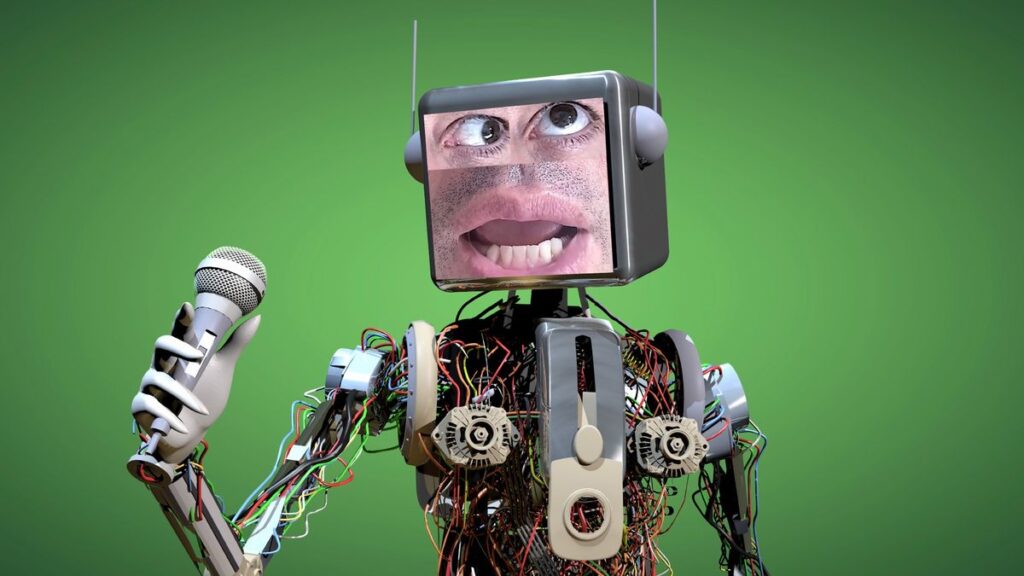Artificial intelligence is prolific. It can write academic papers, diagnose illnesses, and power self-driving cars. But fortunately for those who fear the robots will one day take over, there’s one field where it’s completely useless: humor. That should be heartening for comedy writers who worry that AI will take over their already scarce jobs. “ChatGPT has no childhood trauma,” read one writer’s sign at a writers’ union strike last year, a slogan for those who don’t believe AI can produce meaningful art.
Ask an AI to say something funny, and it’ll spit out clichés. “In one 2023 study, when researchers asked ChatGPT for 1,008 ‘original’ jokes, more than 90% of the replies were the same 25 jokes… none of them were original,” Mashable notes. AI can sometimes be unintentionally funny — “like the insouciant ‘straight man’ in sketch comedy” — but that’s a whole other story. So why does artificial intelligence seem unable to make us laugh, even with infinite knowledge at its disposal?
Why can’t AI be fun?
Comedy is situational, contextual, and sophisticated. Even a simple meme requires layers of understanding to “get” it. Ishani Priyadarshini wrote a thesis about AI’s seeming inability to decipher memes while completing her PhD at the University of Delaware in 2021, according to Popular Mechanics. “Internet memes serve as a great checkpoint for humans to gain an advantage over machines,” Priyadarshini told the magazine.
Subscribe to The Week
Escape the echo chamber. Get the facts behind the news and analysis from different perspectives.
Subscribe and save
Sign up for our free weekly newsletter
From our morning breaking news bulletins to our weekly Good News newsletter, we’ll deliver the week’s best stories straight to your inbox.
From our morning breaking news bulletins to our weekly Good News newsletter, we’ll deliver the week’s best stories straight to your inbox.
Humor is subjective, but AI has no subjectivity or personal feelings. The best comedies are peppered with emotional truth, but as the Writers Guild sign says, AI has no childhood trauma, no wellspring of empathy, and no real-life experiences to draw from. “The popularity of hack jokes relies on a codified pattern-recognition process, so large language models can be taught to churn out passable formulaic material quickly,” The Hollywood Reporter says. “But… [experts] “We believe that original, groundbreaking comedy is likely to remain outside the confines of such machine concepts, at least in the short term.”
Another challenge is that while a lot of comedy pushes the boundaries of politeness and political correctness, “AI is a conservative technology, it doesn’t understand what the taboos are, so it can’t break them,” Cornell University professor Guy Hoffman told the Reporter. AI is programmed to follow established norms, so it has a hard time ignoring them.
Will AI evolve into something interesting?
Some experts believe AI can make progress. A robot comedian named John toured stand-up in 2020 as part of research at Oregon State University, but his setlist was written and programmed by a human. “It’s possible to evolve humor with something like the ChatGPT model, by programming it to favor contradictions and deviations from established norms that are hallmarks of comedy,” Tony Veale, professor at University College Dublin and author of “Your Wit Is My Command: Building AIs With a Sense of Humor,” told the reporter.
“Language models use probability to guide choices,” Veal told the outlet, “and because mainstream theories of humor are concerned with taking an idea and subverting it, we can adjust that probability control from the expected to the unexpected.”
AI hasn’t been given the time that most comedians spend years honing their craft at open mics before they find success. Still, some experts say humans have a clear advantage. “It’s a little like an alien watching stand-up comedy and saying, ‘Oh, I can do that too. I think I see a pattern,'” Mark Riedl, a professor at Georgia Tech’s Center for Machine Learning, told Mashable. “But [the alien] They don’t realize that there’s so much more going on in the comedian’s mind and in the audience’s mind.”
Trust is another factor: “Studies show that people rate humor as one of the jobs that humans are much better able to hand over to AI, alongside news writing, music composition and truck driving (all of which AI has had some success at), ” Time magazine notes.
AI’s evolution into funniness could pose a problem, as its mediocre jokes may eventually become so popular that they cost comedians their jobs. “Experts agree that while AI is clearly a threat to the workforce, it will become a fundamental tool for comedians, like a thesaurus or a search engine,” the reporter said.
To continue reading this article…
Create a free account
If you continue reading this article you will receive exclusive website access every month.
Already have an account? Sign in
Subscribe to The Week
You’ll receive unlimited website access, exclusive newsletters, and many other benefits.
You can cancel or pause at any time.
Already a subscriber to The Week?
Digital and Print + Digital subscriptions include unlimited website access.
To unlock access, create an account with the same email address registered to your subscription.
Source link

